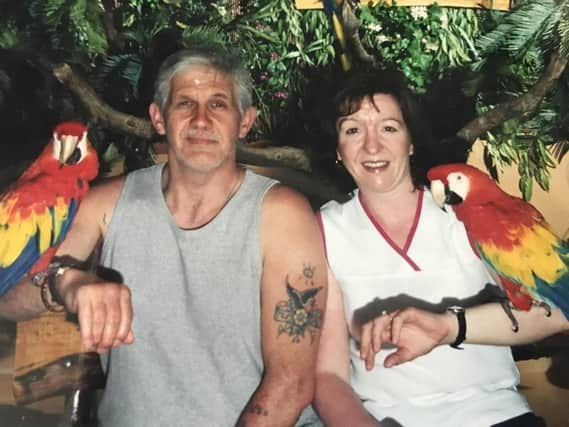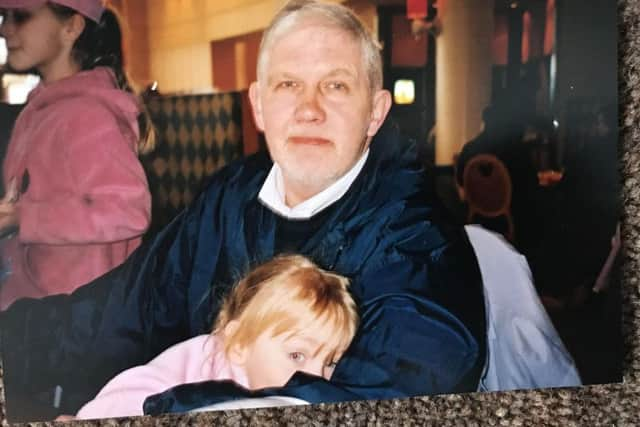Angry East Lothian mum denied bereavement money after death of partner of 20 years


Denise Robertson, from East Lothian, switched jobs and moved house to care for disabled Gary Dunn and the loving couple brought up a daughter together.
Yet just days after he died earlier this month, Denise was told she was ineligible for thousands of pounds because they never wed or entered a civil partnership.
Advertisement
Hide AdAdvertisement
Hide Ad“It makes me angry that we’re being treated differently - that our relationship for 20 years didn’t matter,” said Denise, 58, from Macmerry.


“Why do you have to have a piece of paper to say that you were married?”
Former soldier Gary was diagnosed with chronic rheumatoid arthritis at the age of just 21 - a condition leading to a deterioration in his health later in life.
Yet his death from pneumonia at the Royal Infirmary earlier this month, aged 57, after breaking his hip in a fall at home still came as a devastating shock to his family.
Advertisement
Hide AdAdvertisement
Hide AdJust ten days later, Denise received a letter from the Department for Work and Pensions confirming she and her family were ineligible for bereavement support by law.
The happy couple met in 1999 and moved in together in Prestonpans, bringing up daughter, Rachael, now 17 and studying hairdressing at Edinburgh College.
“They give it to people who’ve been separated for 20 years, it’s just a nightmare,” said Denise. “It doesn’t matter that he’s left a daughter who’s 17 and needs support at college.
Denise estimates missing out on a £3,500 lump sum and about £119-a-week for Rachael up to the age of 21 having spoken to other recipients.
Advertisement
Hide AdAdvertisement
Hide AdA Supreme Court judgement last year ruled that a refusal to pay Widowed Parent’s Allowance to an unmarried woman breached her human rights.
“It’s in the dark ages that people need to be married,” said Denise. “People are not getting married now.
“People get married just to tie things up. If people don’t want to get married, why should they have to?
“We didn’t want to get married. We didn’t see the point. We were quite happy the way we were. People saw us as being married anyway.”
Advertisement
Hide AdAdvertisement
Hide AdDenise gave up working nights in favour of days as an NHS administrator so she could care for Gary as his condition deteriorated - missing out on valuable shift allowance.
And the couple moved from Prestopans to Macmerry in April and a home already adapted for a disabled person.
“I never got any carers allowance or anything like that we managed ourselves. We changed our lives so we could be as independent as possible.
“I don’t understand the whole thing, it doesn’t make any sense to me at all - it’s just bureaucracy and they need to have a look at it.
Advertisement
Hide AdAdvertisement
Hide Ad“And it makes me angry that his own daughter can’t claim it. Why not, she’s 17 years-old she could do that to see her through college.
“It’s just ridiculous. If you’re claiming tax credit you have to claim as a couple but they don’t see you as a couple when your claim bereavement allowance. I just don’t understand it.
“He would be quite devastated that money wasn’t there to help Rachael after all she’s his daughter he’d be hoping there would be some support there for Rachael and for me.”
“We had to change our whole lives practically for Gary - we wanted to do that. Every change we made was for Gary and that’s the support you get from DWP is you’re just wiped off the face of the earth when something happens.”
Advertisement
Hide AdAdvertisement
Hide AdDenise’s other daughter Charlene Campbell, 34, said: “If they were married, even just for one hour then my mum would have been entitled to a bereavement support payment which would help support my sister.”
Labour MP for East Lothian, Martin Whitfield, has now written to Secretary of State for Work and Pensions, Amber Rudd, on behalf of Denise.
“The law, as it is, states that you have to be married or in a civil partnership to qualify for bereavement support,” said Mr Whitfield.
“But it raises the question, has the government reviewed this to consider what impact it has on society as a whole and people in relationships who are not in civil partnerships or married.
Advertisement
Hide AdAdvertisement
Hide Ad“The reality is that women are living longer and tend to be the remaining spouses so are missing out on this support available to others simply because they’re not married or in civil partnerships.”
A DWP spokesperson said: “We are committed to supporting people during bereavement and have widened the support available.
“This is in addition to help provided for cohabiting couples through the wider welfare system.”